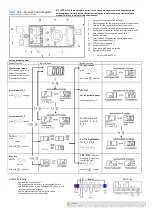
MDS Master Station
Setup Guide
05-6398A01, Rev. C
MDS Master Station Setup Guide
1
1.0 INTRODUCTION
The MDS Master Station serves as a central station in a multiple ad-
dress system (MAS) wireless network. It provides long range, duplex (or
simplex) communication between a control point and associated re-
motes. It is fully redundant for mission-critical applications, and is a
compatible replacement for older MDS x790 Master Stations.
The MDS Master Station works with a wide array of wireless equipment,
including MDS SD Transceivers, legacy MDS x710 radios, and addi-
tional wireless options, depending on the modules installed in the
chassis.
Figure 1: MDS Master Station
All modules are installed on slide-in assemblies, accessible from the
front of the unit. A protective cover on the unit’s face slides off, allowing
access to the modules and all interface connectors. In addition to
communication modules, up to two power supply units may be installed
and are available to suit a wide range of AC and DC power require-
ments.
Each module is secured to the chassis with knurled fasteners for easy
changes, when required. Figure 2 shows a common configuration of
installed modules.
Supply 1 (DC)
Supply 2 (AC)
Platform Manager
Radio A
Radio B
Alarm/Relay
Duplexer
Figure 2: Front Panel Connectors & Indicators
(Front cover removed)
Master Station modules are factory installed and cabled.
Table 1:
Module Descriptions - Redundant Station
describes each module
installed in a redundant configuration, from left to right. For a
non-redundant configuration, blank plates are used in place of the
redundant power supply and radio modules and a
non
-redundant ver-
sion of the Alarm/Relay module is installed.
The MDS Master Station supports Ethernet or serial polling depending
on order options. A host computer may be connected to the appropriate
port on the chassis (LAN for Ethernet; COM1/2 for serial signaling).
Configuration of the unit is performed through a web interface. This
requires a LAN connection to one of the Ethernet ports on the Platform
Manager module. Configuration options are similar to those of the SD
Transceiver and the radio supports full SD functionality in transparent
mode. In addition, a command line interface (CLI) is available through
the mini USB port using the proper USB drivers available at
www.gemds.com
.
Table 1: Module Descriptions - Redundant Station
Module
ID
Function
Power Supply 1,
Power Supply 2
Varies
Input power supply. In a redundant
configuration, both supplies work in
tandem and are independent of which
radio is active.
Platform Manager
6834
Provides management and data interface
functions.
Radio A,
Radio B
6846
(SDM9)
Single or redundant full duplex SD Master
radios.
Alarm/Relay
6847
6848
Redundant
—Active radio relay and
alarm/audio interface.
Non-redundant
—Alarm and audio
interface.
Duplexer
6837
Internal RF duplexer (if equipped)
1.1
Related Documentation
In addition to this setup guide, the
MDS Master Station Technical
Manual
(05-6399A01, under development) provides guidance on sys-
tem design, advanced configuration, and maintenance. The
Technical
Manual
is available to personnel involved in the design, commissioning
and maintenance of the network. Electronic copies of the latest user
documents and support files are available free of charge at
www.gemds.com
.
1.2
Options and Accessories
The MDS Master Station may be equipped with optional battery backup
(10-watt RF power output - 5 watt is standard) and a variety of duplexer
and module options. Contact your factory representative for information
on any of these options.
In addition, GE MDS offers an
Accessories Selection Guide
listing
additional items that may be used with many of our products. Contact
your factory representative or visit
www.gemds.com
for the latest copy.
1.3
Typical Application
Figure 3: Application Example
on the following page shows a
common arrangement of the MDS Master Station as used in a multiple
address radio network. The system shows both SD and legacy x710
remote transceivers in use.
Depending on order options, the MDS Master Station can communicate
with remotes employing Ethernet signaling, serial signaling, or a mix of
both.
























